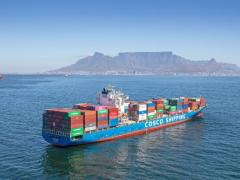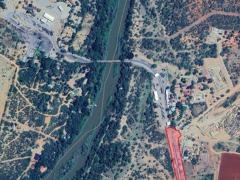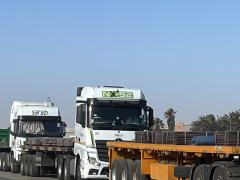South Africa’s transport sector leaders and suppliers focused on the challenges and opportunities facing trucking businesses at the Road Freight Association's (RFA) 50th-anniversary conference over the weekend.
The conference presented delegates with a deep dive into the critical challenges and opportunities facing the transport sector, featuring experts across specialised fields, from green energy to broad-based black economic empowerment (B-BBEE) and finance. The annual event took place at Champagne Sports Resort in the central Drakensberg.
Absa chief investment officer Ricardo Smith unpacked the economic roadmap, providing insights into potential growth strategies in a volatile global economic landscape, while political analyst Ongama Mtimka offered a nuanced perspective of the transformative process over the decades.
Powerfleet Africa general manager Steven Sutherland tackled the technological frontier of using Artificial Intelligence to improve driver safety and fatigue management. Cape Africa Group director, Ian Bird, examined the opportunities and challenges of integrating road and rail freight.
A panel session brought together industry leaders including Warwick Lord, chairperson of the Multimodal Inland Port Association. Mike Daniel, CEO of Railrunner South Africa, and Liesl de Wet, RFA Green Transport Working Group chairperson, who explored the energy transition.
Graeme Barnard delved into equity and compliance, unpacking the implications of the latest BBBEE scorecard and concerns regarding its impact on the sector.
RFA CEO Gavin Kelly, delivering the opening address, highlighted the 50-year journey of the organisation and challenges currently facing its members in the Southern African Development Community. Kelly delivered the address on behalf of chairman Penwell Lunga who was absent due to a family bereavement.
Kelly said the association had collaborated with current and former government officials on transport issues and policy development.
"The RFA had its beginnings in 1975, and we're celebrating 50 today. It's not necessarily that the RFA itself is 50 years old, but it has inherited (its existence) from the structures that existed before it,” he said.
Kelly added that a landmark achievement of the RFA was the key role its representative at the time, Jack Webster, had played in discussions with the Department of Transport to develop Chapter 6 of the National Road Traffic Act, which had levelled the playing field for operators.
Chapter 6, titled ‘Operator Fitness’, outlines the requirements for operators of certain motor vehicles, the registration of operators, the issuing and display of operator cards, and the duties and powers of operators.
Kelly recounted detailed negotiations about maximum allowable vehicle dimensions for a 22-metre superlink (two joined trailers) truck that had taken place at the time to shape regulations.
"How it got to be 22 metres is an interesting discussion. I remember being at the department (as a government official) when there was this heavy argument of how you would measure the 22 metres,” Kelly said.
“The department was following the American process, which was, you measured the 22 metres from behind the driver's seat to the end of the vehicle. So the 22 metres actually would have ended up being about 25, but the representatives of the organisation said ‘no, from the front of the vehicle,’ and then we had a bumper in the front and we had a bumper at the back. So that’s how we got to 22 metres,” he said.
Beyond legislative achievements, Kelly outlined the RFA's ongoing focus on contemporary challenges such as artificial intelligence and crime.
“One of the best things that happened to the RFA in terms of digital transformation was Covid-19. The RFA actually went on to an electronic basis just before Covid happened, and we've never looked back. It gave the board the opportunity to relook at many things and to change going forward,” he said.
"AI is a huge disruptor. It's going to disrupt many things: the way in which you move goods, the way in which you employ people, the way in which goods are paid for, or warehouses and stock levels are managed."
However, he said the association was committed to navigating the technological revolution.
Key focus areas in future would be e-commerce, the African Continental Free Trade Area, and the critical need for rail to "carry its fair share" of freight, he said. He also noted the importance of cross-border logistics and the potential for growth across African markets.
Turning to the impact of crime, Kelly said criminals had become increasingly sophisticated in the way they targeted goods and supply chains.
"Crime has become clever," Kelly warned.
"About five years ago, it was primarily about hijacking trucks. We had good anti-hijacking teams from the SAPS that were hitting criminals on the road. Now, they've changed tactics."
Kelly said criminals were now targeting the source of goods rather than individual trucks. "Why hit one truck at a time?" he said. "Now they go to the distribution centre."
He noted that cooking oil and food products were among the most frequently targeted goods, with a significant portion being sold at the Beitbridge border with Zimbabwe.
He highlighted that mealie meal was currently the most targeted commodity, explaining the strategic reasoning behind this choice.
"The truck doesn't carry 40 tonnes of mealie meal. It carries pre-packed mealie meal, which is very easy to get rid of."
"Look at the price of mealie meal at the shop just before the border, where most of the Zimbabweans can come across to buy the mealie meal and go back, and look at the price of that same packet of mealie meal at your local shop. That tells you where a lot of this mealie meal will go,” he said.
Kelly added that the RFA had grown its membership by 12% in 2024, with members across South Africa, Botswana, Namibia, Mozambique, Eswatini, Zimbabwe, Zambia and Malawi.













